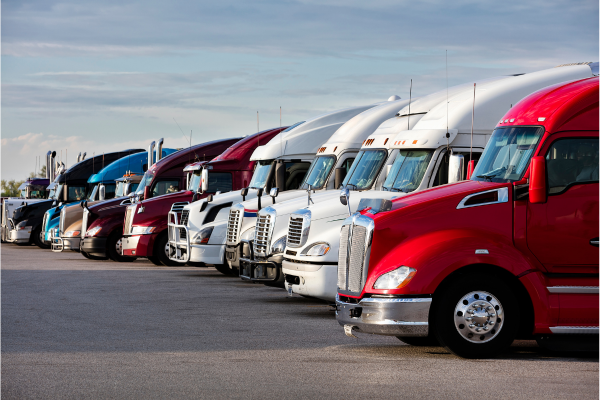
Trucking collisions are often the result of a combination of human, environmental, and mechanical factors. Given commercial trucks’ significant size and weight, even minor misjudgments or malfunctions can lead to severe accidents. Below is an exploration of the main causes of trucking collisions.
Driver-Related Factors
Human error plays a significant role in trucking accidents. Common driver-related causes include:
Fatigue
Truck drivers often face long hours on the road, sometimes exceeding legally mandated driving limits. Fatigue reduces reaction time, impairs judgment, and can lead to microsleep episodes, where drivers briefly lose consciousness without realizing it. According to the National Highway Traffic Safety Administration (NHTSA), fatigue is one of the leading causes of trucking accidents.
Distracted Driving
Distractions such as using mobile phones, eating, adjusting the radio, or even daydreaming can divert a driver’s attention from the road. Given the complexity of maneuvering large trucks, even a momentary lapse can have catastrophic consequences.
Speeding and Aggressive Driving
The pressure to meet tight delivery deadlines can lead truckers to exceed speed limits or drive aggressively. High speeds make it difficult to stop in time to avoid collisions, especially for vehicles weighing up to 80,000 pounds.
Impairment
Driving under the influence of alcohol, drugs, or prescription medications can severely impair a driver’s ability to operate a truck safely. Even slight impairment can magnify the risks due to the sheer size and weight of the vehicle.
Inadequate Training
Driving a commercial truck requires specialized skills and training. Drivers who lack proper training may be less equipped to handle challenging conditions, such as navigating sharp turns, driving in adverse weather, or responding to sudden road hazards.
Vehicle-Related Factors
Mechanical failures and maintenance issues also contribute significantly to trucking collisions.
Brake Failure
Faulty or poorly maintained brakes are a common cause of accidents. Given the weight of commercial trucks, any delay in braking can drastically increase stopping distances and the likelihood of a collision.
Tire Blowouts
Improperly maintained tires or defects can lead to blowouts, causing drivers to lose control of their vehicles. Blowouts are particularly dangerous on highways, where high speeds amplify the impact of accidents.
Load Shifting or Overloading
Improperly secured or overloaded cargo can shift during transit, making the truck unstable and harder to control. Overloading also increases the strain on braking systems, potentially leading to failures.
Lighting and Visibility Issues
Malfunctioning headlights, taillights, or turn signals can make it difficult for other drivers to anticipate a truck’s movements, increasing the risk of accidents, especially at night or in low-visibility conditions.
Environmental Factors
Road and weather conditions often play a critical role in trucking accidents.
Adverse Weather
Rain, snow, ice, and fog can make roads slippery and reduce visibility. Trucks, with their extended stopping distances and larger blind spots, are particularly susceptible to losing control under such conditions.
Road Conditions
Poorly maintained roads, potholes, uneven surfaces, and inadequate signage can pose challenges for truck drivers and lead to accidents. Sharp curves and narrow lanes also increase the risk of rollovers or side-swipe collisions.
Traffic Congestion
Heavy traffic can lead to sudden stops or erratic lane changes by passenger vehicles, making it difficult for trucks to react in time. Rear-end collisions are common in such scenarios.
Interaction with Other Vehicles
Trucking collisions are not always the fault of truck drivers. Passenger vehicle drivers may contribute by:
- Cutting Off Trucks: Cars that cut in front of trucks can leave insufficient stopping distance.
- Driving in Blind Spots: Trucks have large blind spots, and vehicles lingering in these zones are at high risk of being struck.
- Erratic Behavior: Sudden braking, swerving, or merging without signaling can lead to accidents.
Regulatory and Logistical Challenges
Some trucking accidents are caused by things that occur off the road.
Violation of Hours-of-Service Rules
Despite regulations limiting driving hours, some drivers and companies ignore these rules to meet delivery deadlines, increasing the risk of fatigue-related crashes.
Pressure from Employers
Some trucking companies prioritize speed over safety, pressuring drivers to cut corners or ignore safety protocols to meet tight schedules.
Prevention and Safety Measures
Reducing trucking collisions requires a multi-pronged approach:
- Strict Enforcement of Regulations: Ensuring compliance with hours-of-service limits and vehicle maintenance standards.
- Driver Training Programs: Comprehensive training and periodic assessments for truck drivers.
- Technology Adoption: Utilizing advanced driver-assistance systems (ADAS), such as automatic emergency braking and lane-keeping assist.
- Public Awareness: Educating passenger vehicle drivers about safely sharing the road with trucks.
Contact a Florida Personal Injury Lawyer
If you have been involved in a personal injury incident, seeking legal advice is essential to protect your rights. Our legal team has more than 40 years of experience seeking justice for accident victims. Our attorneys have sought and won millions of dollars for our injured clients.
Call 850-601-1111 to schedule a complimentary consultation with no obligations. This consultation will help you explore your legal options. Let us help you fight for fair compensation.


